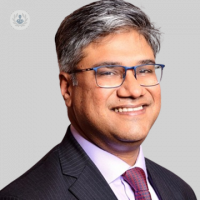Primary liver cancer surgery (Part 2)
Written in association with:In part one of this two-part series, Mr Deepak Hariharan shared his expertise on primary liver cancer surgery, including success rates and risks. Here, in part 2, he answers the key questions regarding recovery from this kind of procedure.

Does the liver regrow if part of it is removed?
The liver is the largest solid organ in the human body, which acts as a detoxifier, its prime function is to maintain equilibrium (homeostasis) in the body. It is unique in its inherent ability to regenerate, recover function, and ensure optimum liver to bodyweight ratio. That is as long as any injury or deformity, be it physical (wounds, surgery) or chemical (medications, toxin, alcohol), is removed. There exists a complex cascade and interplay of extracellular and intracellular events. This enables the recruitment of all cells within the liver to rapidly reproduce and rebuild. The process of regeneration is divided into three phases of a) initiation, b) proliferation (multiplying) and c) termination.
Liver regeneration remains an area of extensive medical research and study, providing vital insights to understanding the marvels of the liver and the human body. Liver surgery relies on this very mechanism of regeneration as today we can safely remove close to 70% of liver volume to affect cure from cancers affecting the liver.
What follow-up is required post-surgery?
Patients are extensively counselled in an outpatient clinic before undergoing liver cancer surgery. On completion of surgery and discharge from hospital, patients are immediately assessed in the outpatient setting to check on their surgical wounds and inform them of the state of the organ (confirmation of cancer, completeness of resection and recommendation to see oncologist if needed for consideration of adjuvant additional chemotherapy). Patients remain under surgical / oncology or medical follow-up where they are seen and assessed clinically and radiologically at approximately 6 monthly intervals to look out for local and distant recurrence of cancer disease.
What are the chances that liver cancer recurs after surgery and is further surgery possible?
Recurrence of cancer remains one of the key concerns after liver cancer resection surgery. The recurrence rates can be up to 60-70% in 5 years. Patients are intensively followed up in surgical/ oncological or medical hepatology clinics to look for patterns of disease recurrence that can be within the liver or outside. In the event of isolated local disease recurrence in the liver, patients are reassessed as they were at the initial time of liver surgery where their current performance status, remnant liver function, disease recurrence and distribution are re-discussed in a multidisciplinary team and treatment options, which include redoing liver surgery as the recommendation is made.
What must people avoid after liver cancer surgery?
Liver cancer surgery as treatment is a major event in the lives of patients. In the initial recovery phase (0-3 months) patients are encouraged to eat nutritiously, mobilise and perform gentle exercises without lifting heavy weights. They are advised to avoid unnecessary intoxication to the liver such as excess alcohol, liver-toxic medications or toxins. When in doubt they are advised to check with their primary care physicians, medical hepatologists and liver surgeons for advice on how to proceed.
If you are experiencing liver problems, you may need to see a specialist like Mr Hariharan. You can request an appointment with him by visiting his Top Doctors profile.


